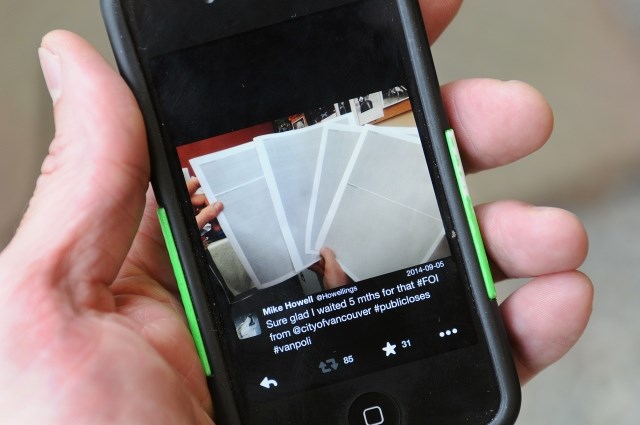It isn’t exactly Giller Prize-winning literature, but the extremely dense Freedom of Information and Protection of Privacy Act can make for some semi-interesting reading.
Especially this week.
Both the City of Vancouver and Vancouver Police Department were embroiled in stories involving the Act, and neither agency fared well in the media reporting of why they made news.
I’ll begin in chronological order…
The Office of the Information and Privacy Commissioner announced Tuesday that it will review the city’s access to information practices, which is kind of a big deal for us in the news biz who don’t get a great deal of satisfaction in response to requests for information.
So why Vancouver?
Well, it’s the biggest municipality in B.C. and correspondingly receives a large volume of requests. We’re talking 350 to 400 per year. And with all those requests, many of the folks seeking information weren’t happy with the response from the city and lodged complaints
In explaining why Vancouver was targeted, Privacy Commissioner Elizabeth Denham’s office posted a statement on its website saying that in four of the last five years, the city ranked among public bodies with the highest number of complaints and access to information appeals.
The city was semi-quick to react to the news.
Acting city manager Sadhu Johnston returned my call – after deadline -- and spoke to me via speaker phone, with the city’s head of communications Rena Kendall-Craden and communications staffer Tobin Postma listening in.
In the brief interview (he had other media calls to return, he said), Johnston repeatedly said the city has a “robust” system for handling information requests but was willing to update that system, if the commissioner’s office saw fit. He noted the city was updating its software to better archive and manage its FOI requests.
But why not, I asked, just release information – reports, statistics, memos or whatever it is -- to people instead of making them file a request under the Act?
He didn’t really answer the question, instead offering this: “Well, in 2014 we released 33,000 pages in the FOI process. We spent 1,300 hours responding.”
He didn’t elaborate on how many of those pages were redacted – a common practice, as I learned in receiving dozens of blacked-out pages in 2014 related to a request for housing documents.
Johnston pointed out that of the 386 FOI requests filed last year, 47 of them resulted in complaints. Johnston described some of the complaints as “pretty basic,” noting a request for the number of noise complaints to a specific address turned up no records.
“That was considered a non-responsive response,” he explained.
Over at the VPD, its media relations department spent a great deal of Thursday and Friday trying to explain why the department couldn’t say whether it owned a controversial surveillance device that can monitor people’s cellphone conversations and text messages.
The VPD was forced to speak about the so-called “StingRay” electronic tool – which is popular in the United States and works as a fake cell antenna that allows law enforcement to intercept phone calls -- because of an FOI response the department gave to the Pivot Legal Society.
Pivot requested records related to any use, discussion or purchase of the device.
Here’s what the VPD, in a letter, told Pivot: “The head of a public body may refuse to disclose information to an applicant if the disclosure could reasonably be expected to…harm the effectiveness of investigative techniques and procedures currently used, or likely to be used, in law enforcement.”
That response was pulled from a section of the Freedom of Information and Protection of Privacy Act. And it was a response that led Pivot to wonder whether the VPD had, in fact, admitted it owned a StingRay.
The VPD wasn’t happy with the reporting of the story and issued a statement Friday saying it wanted to clarify “some very misleading news reports suggesting we are randomly listening to private cellphone conversations.”
“This is incorrect,” said the statement, which went on to say that speculating the VPD has the device because other police departments use it “would be an inappropriate assumption.”
“What is important to know is that the VPD does not randomly listen to the cellphone conversations of citizens. Any covert monitoring of communications is only done during serious criminal investigations pursuant to the Criminal Code, and with prior judicial authorization from the courts.”
So while we still don’t know whether the VPD has a StingRay or understand the extent to which the City of Vancouver’s access to information practices are failing the public, at least we know this: People want to know what the heck is going on at their city hall and at their police department.
And that’s a good thing.
@Howellings



